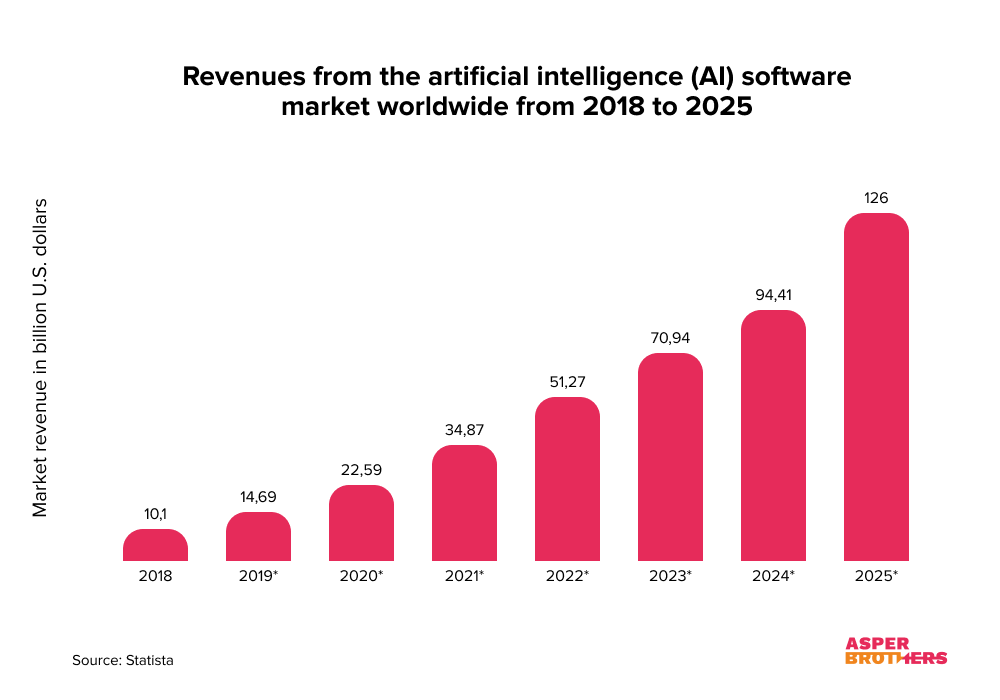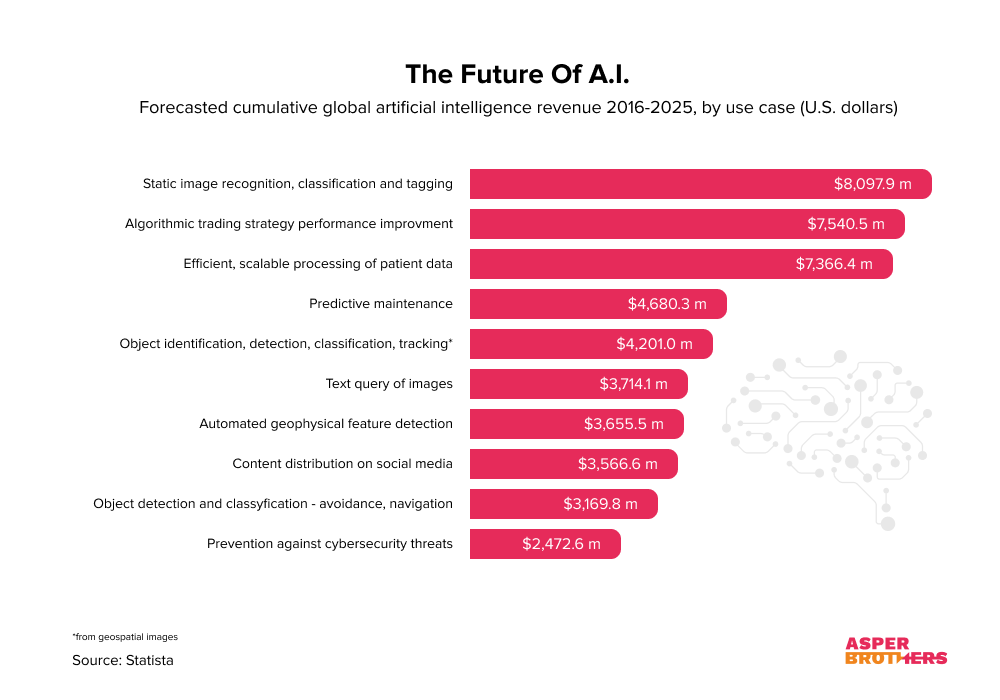Automated Valuation Model (AVM) – Examples of Uses of Big Data Software in Real Estate
The real estate industry is one of the oldest and most prominent ones still on the market, but it’s also...

Nowadays, artificial intelligence is becoming increasingly popular. The term refers to the implementation of human intelligence in machines designed to learn and emulate human behavior. These machines will perform human-like duties as they become more adept. With technologies such as AI being developed further, they will profoundly impact our quality of life.
Whether you are an individual user or an aspiring AI professional, there is an inherent desire to be connected with AI technology.
AI poses the question: What impact will it have on us? – it has been the subject of many debates both within and outside the scientific community. No matter what kind of discussions are held, we cannot neglect that artificial intelligence has dramatic effects on business practices. Artificial Intelligence has the potential to outperform human performance. Making rational decisions would be one aspect, doing a better job or maintaining emotional connections.
Gartner’s 2019 CIO Agenda survey reported that companies deploying artificial intelligence (AI) increased from 4% to 14% between 2018 and 2019. In any case, artificial intelligence will positively impact our society and lead us to redefine humanity.
The potential contribution to the global economy from AI could be $15.7 trillion in 2030.
source: semrush.com
Streamlining job processes and aggregating business data are just a few of the many ways artificial intelligence is beneficial for businesses.
Artificial intelligence is recognized for its enhanced performance in such processes as logical analysis, knowledge sharing, goal setting, communication efficiency, and how it interprets and processes things. This article will examine some AI applications and the latest trends in the top 6 industries set to revolutionize businesses today.
Sales are challenging, especially in B2B. Closing deals is time-consuming, and conversion rates are low. Customers do not just whip out their credit cards and buy. They need to be guided and validated. To nurture a healthy relationship with your customers, take the time to meet them, answer their questions, and continue providing guidance afterward.
By utilizing artificial intelligence, the sales processes can be improved. As reported by Harvard Business Review, AI-based sales campaigns increased leads by more than 50%, slashed call times by 60-70%, and reduced costs by 40-60%.
As a sales leader, you may hear that artificial intelligence will take over the world. Imagine a future where inexpensive yet effective AI assistants handle all sales.
AI is not yet developed enough to deal with the complex conversations and relationship-building required in sales; thus, Gartner predicts that only 30% of B2B companies will utilize some form of AI to improve some function of their core sales operations.
Today, artificial intelligence is not intended to replace sales reps. But instead, it is meant to serve as an assistant in completing the following:
The advent of artificial intelligence is expected to be the most powerful tool ever devised by experts. Considering that real estate requires a lot of human interactions, conversational AI is an ideal solution for real estate businesses.
Have you ever sought to know the value of a property? Instead of dealing with the hassle of searching for an appraiser, opt for an automatic valuation model (AVM). AVM is typically used to assess residential and commercial real estate and aid in lending mortgages and loans. Let’s delve a little deeper into an automated valuation model and how real estate companies can use it.
An automated valuation model (AVM) is a software-based tool primarily applied to the residential and commercial real estate industry to determine the value of a property. The service employs mathematical calculations and statistical analysis along with database records to evaluate the value of a specific property. AVMs are commonly used within the real estate sector.
Real estate professionals, realtors, and loan officers rely on AVMs as a baseline to analyze properties. This service is intended to deliver accurate appraisals of property values to e-commerce providers and large online retail websites like iBuyers.
For instance, iBuyer relies on AVM to provide a rough evaluation of your property’s value. Once the estimate is ready, you can start selling your house without any need to contact a real estate representative or arrange a meeting with potential buyers.
Real estate businesses can also benefit from AI to deliver customized experiences. For example, consumers are more likely to purchase a brand that offers personalized experiences. AI-powered bots can provide customized recommendations using context, like location and language, in conjunction with clickstream data to better identify the type of real estate the customer is looking for online. In combination with AI insights, these personalizations can enhance the customer experience and increase conversions and open the doors to cross-selling and upselling opportunities based on analytics.
It is possible to improve customization by analyzing the client’s behavior using intent analysis and natural language processing. Consequently, they can provide customers with real-time support throughout the day while following a conversational approach to understand the prospects’ needs, offering options to buy, sell, and rent based on the methods they have been trained for, and acting uniquely in each approach. This way, you can retain and convert more visitors to your website.
For the past few years, we have seen an increased interest in AI solutions for the real estate industry. We are one of the few companies in the world to implement unique solutions for automated real estate valuation and big data processing to analyze changes in this market. Thanks to such solutions it is possible to make better business decisions for both individual clients and companies. CEO, ASPER BROTHERS Contact Me
AI Marketing relies on automated decision-making through data gathering, analysis, and further consideration of audience and economic factors that can impact your marketing efforts. Artificial Intelligence is used frequently in marketing campaigns where speed is crucial. AI customer profiles and data are used to learn how to best communicate with customers and then deliver tailored messages at the right time without the involvement of the marketing team, ensuring maximum efficiency.
Marketers commonly use AI to enhance their marketing team performance or accomplish more tactical tasks requiring less human nuance. With artificial intelligence, your marketing efforts will become more personalized in many ways. For example, many companies already use artificial intelligence to personalize their websites, emails, social media posts, and videos to provide a better customer experience. You should also consider using fastest hosting to convert website visitors into loyal customers.
For example, eCommerce businesses that make push notifications mobile-friendly get better results. Push notifications are delivered via mobile to create a sense of personalization among customers, so they gain more attention when executed well. This is because each customer will receive a customized push notification based exclusively on what they’ve viewed or what they’d like to hear from a brand. The AI-enhanced product recommendations are another amazing AI marketing technique for providing more personalized customer experiences than many marketers have ever imagined.
In 2021, the increase in AI usage across businesses will create $2.9 trillion of business value and 6.2 billion hours of worker productivity.
The automation of services has reached its peak by now, providing users with a convenient way to complete their daily activities. For example, modern automated systems allow users to book a restaurant reservation, order a pizza or buy tickets for events. As artificial intelligence becomes a more prevalent technology that has revolutionized almost all challenging markets, the customer service industry is gaining much traction.
Let’s discuss three benefits of employing artificial intelligence to help your customer support team.
Prompt responses: AI can answer frequently asked or simple questions with live chat experiences. They can also refer customers to self-service articles for further information. Furthermore, they’re available 24 hours a day so that customers can get assistance from your company at any time.
Enhanced research performance: The process of conducting research is typically time-consuming, but you can use research automations to speed up the process. For example, using AI technology, it is possible to store answers and identify infrequently asked questions. Agents are thus provided with a list of standard solutions based on the ticket’s content.
A higher level of customer engagement: AI can synthesize information from CRM solutions to highlight key customer information and make it instantly available to agents. This enables them to approach customer interactions with more efficiency.
Essentially, AI is not here to replace customer support teams but to enhance their efficiency. Artificial intelligence can retrieve information efficiently but cannot replace or replicate human relationships. Nevertheless, using AI in support teams can improve their productivity and strategic thinking.

The data shows that AI will make an increasing impact on enterprise revenue generation. / Data Source: Statista.com
Developers have released a wide range of products. Your HR managers will manage their daily workflows more efficiently by using the right tools, thus spending less time on each task. Speed increase won’t have an impact on quality. Therefore, employees will be more productive and accurate.
How does that work in practice? By integrating an AI-based tool, your HR managers can:
As a result: using AI-based tools leads to faster work and better results. By using them, your employees can process large amounts of data in less time to achieve better results more quickly than manual processing.
Modern business practices have been altered by AI technology. This technology helps companies stay one step ahead of their competitors, from repetitive tasks to data analytics. Additionally, AI also improves risk management and provides a better user experience.
AI helps businesses identify their targeted customers by analyzing their purchasing habits. Consequently, the process is simplified and more efficient. The result is a reduction of the costs associated with the process.

AI and related solutions are a rapidly growing field today. It can be expected to expand into new areas of the economy every year. / Data Source: Statista.com
We live in a world driven by artificial intelligence (AI). Most likely, you have used it during your daily commute while searching the web or catching up on social media.
To sum it up, the impact of artificial intelligence on both your personal and professional lives is massive, whether you realize it or not. Anyway, the examples above are merely a few of the business applications of AI. Many more examples of digital innovation in business exist with the arrival of Industry 4.0 technologies. With progress accelerating, more developments are likely to follow soon.

The real estate industry is one of the oldest and most prominent ones still on the market, but it’s also...
Though the visions sci-fi authors presented us with have yet to really come to fruition, there’s no denying one...
It should be surprising that considering the current investments in PropTech, real estate has been slow to adopt innovation. But this...